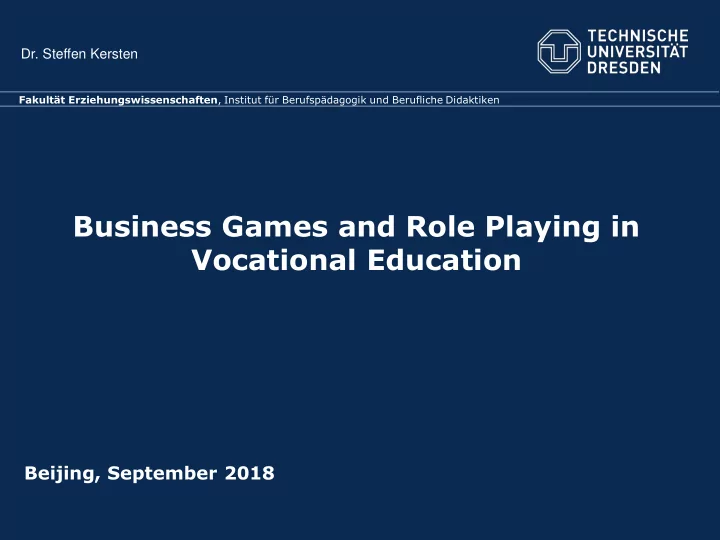

Dr. Steffen Kersten Fakultät Erziehungswissenschaften , Institut für Berufspädagogik und Berufliche Didaktiken Business Games and Role Playing in Vocational Education Beijing, September 2018
Business Game - Characteristics - Business game is based on a model. Models are replicas of any sections of reality. - Business game takes place on a defined game field. - The game of chess is based on rules. These rules determine the own actions as well as the feedback of the game model. - The game situation creates a competitive situation - The acting of the players requires decisions. - The decisions and consequences from their are without risk in relation to reality. - Business game is results-oriented. (problem solution) - In the business game, strategies can are tested. - Business game can be a Monopolistic simulation (for example flight simulator) Duopolistic simulation Polypolistic simulation (for example stock market game) Folie 2
Types of Business Game a) degree of freedom of the decision area - Free games (free decisions without solid prestructuring) - Fixed games (only the choice between limited alternative choices is possible) b) decision-dependence - Deterministic games (results are entirely dependent on the decisions of the players) - Stochastic games (random elements can affect the results) c) influence of other playgroups - Interactive games - Non-interactive games d) the complexity of the game model - Simple games - Complex games e) evaluation of the Games - Manual Games - Computer-based games Folie 3
Process of busin iness game cp. Kaiser, F.J.: Entscheidungstraining 1976, S. 109 Folie 4
Role Playing ing „ Role playing is a form of play, in which the participants spontaneous play in a fictional game action with the intent to process behaviour problems - both playfully presented as discuss afterwards. In this game, the social relations between the players as the real visible behaviour should become criticized and changed.” Binger, L.: Fall aus der Rolle. Spiele in der Schule. Berlin 1977, S. 93f. Social basic skills after KRAPPMANN - the ability to empathize with a partner, to appraise his needs (emphaty) - the ability to conflicting needs and expectations of partners to be able to endure (ambi mbiguity tolerance) - the ability to adapt the own role behaviour to the situation (comm mmunication skills) cp. Krappmann, Lothar: Soziologische Dimension der Identität: strukturelle Bedingungen für die Teilnahme an Interaktionsprozessen. Stuttgart 1988 Folie 5
Aspects of Modern Role-Playing theatrical aspect - Accomplishment of given plays through to performing game as an art form - Only when a guideline is available psychoanalytical aspect - In the game's plot are projections and transfers of Player on his role in the game instead. sociological aspect - Processing of social conflicts - If in the game social positions should are take over, to these positions addressed experiences are updated consciously or unconsciously Source: Warm 1981, p.89 Folie 6
Process of role le playin ing 1. Orientation of the group (confrontation with the problem) 2. Selection of participants of the role play 3. Planning of the scene sequence 4. Instruction of the audience on their role as participant observers 5. Role play 6. Discussion and evaluation 7. Next games (exchanged roles, alternate scenes) 8. Next discussions 9. Summary and generalization Folie 7
Role Playing ing Source: Kumar, Mohan, 2011
Evalua luatio tion of Role Playing ing Product of the role play Process of the role play (result evaluation) (process evaluation) cognitive learning social learning learning organization organization of play objectives objectives - acquisition of - ability to cooperate - effectiveness of the - assessment of the specialized in groups organization of planning of role play knowledgeon the learning - ability to form - usefulness of video topic of the - Time required for common positions recordings of the role play the role play - ability to convince play - ability to identify in the selected role - optimal group size - assessment of the various viewpoints leadership of the play Overall assessment and critique
Dr. Steffen Kersten Fakultät Erziehungswissenschaften , Institut für Berufspädagogik und berufliche Didaktiken Thank you for your attention Beijing, September 2018
Recommend
More recommend